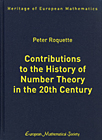- About MAA
- Membership
- MAA Publications
- Periodicals
- Blogs
- MAA Book Series
- MAA Press (an imprint of the AMS)
- MAA Notes
- MAA Reviews
- Mathematical Communication
- Information for Libraries
- Author Resources
- Advertise with MAA
- Meetings
- Competitions
- Programs
- Communities
- MAA Sections
- SIGMAA
- MAA Connect
- Students
- MAA Awards
- Awards Booklets
- Writing Awards
- Teaching Awards
- Service Awards
- Research Awards
- Lecture Awards
- Putnam Competition Individual and Team Winners
- D. E. Shaw Group AMC 8 Awards & Certificates
- Maryam Mirzakhani AMC 10 A Awards & Certificates
- Two Sigma AMC 10 B Awards & Certificates
- Jane Street AMC 12 A Awards & Certificates
- Akamai AMC 12 B Awards & Certificates
- High School Teachers
- News
You are here
Contributions to the History of Number Theory in the 20th Century

Publisher:
European Mathematical Society
Publication Date:
2013
Number of Pages:
278
Format:
Hardcover
Series:
Heritage of European Mathematics
Price:
98.00
ISBN:
9783037191132
Category:
Monograph
The Basic Library List Committee recommends this book for acquisition by undergraduate mathematics libraries.
[Reviewed by , on ]
Fernando Q. Gouvêa
11/13/2014
After a distinguished mathematical career, Peter Roquette has spent the last few years writing on the history of algebra and number theory in the 20th century. One of his motivations comes from the papers of Helmut Hasse, which are archived in Göttingen. Hasse seems to have saved everything; Roquette has led the way in transcribing this material, publishing Hasse’s correspondence with Emil Artin (in German and now an expanded edition in English translation) and Emmy Noether (in German only). He has edited Hasse’s mathematical diary and has made a lot more material available online.
In addition to transcribing and editing these primary sources, Roquette has written many articles based on and inspired by this material. This volume collects several of these contributions, which range from straight history (e.g., the Noether material) to mostly mathematics with a touch of history (the article on Hoechsmann's theorem).
The leading article is an updated version of The Brauer-Hasse-Noether Theorem in Historical Perspective (Springer, 2005), tracing the history of the theorem via a close inspection of the correspondence surviving in the Hasse archives. When I reviewed the original publication, I expressed the hope that Roquette would continue exploring this period. Happily, he has.
Several of the articles in this volume deal with Emmy Noether, especially in the period between 1933 and 1935. For example, Roquette reproduces here, in German and in translation, Hermann Weyl’s moving statement at Noether’s funeral, which is much shorter and more personal than the often-reprinted formal Memorial Address he gave a few days later. He has collected the “testimonials” about Noether presented to the German government in 1933 in a vain attempt to stave off the inevitable. He has also found quite a bit of information about the circumstances surrounding Noether’s move to Bryn Mawr and about her activities there. But the articles include a broad summary of Noether’s mathematical career as well.
Two articles deal with Cahit Arf, the Turkish mathematician who was Hasse’s student and whose name is attached to the “Hasse-Arf Theorem” in number theory. There is an article on Otto Grün, who, despite not having a university education, managed to teach himself enough mathematics to make substantial contributions to group theory. Hasse seems to have been a kind of mentor to Grün, so the Hasse archive sheds great light on how exactly that happened. In particular, Hasse’s great generosity is evident in the time and effort he put into helping Grün put his papers into publishable form.
There are many insightful comments throughout. Roquette points out, for example, that Noether was nearly 40 years old when her Idealtheorie in Ringbereichen appeared in 1921:
The mathematical life of Emmy Noether is one of the counterexamples to the dictum that mathematics is a science for the young and the most creative work is done before 40. Emmy Noether would not have been a candidate for the Fields Medal if it had already existed at that time. (p. 138)
Take that, Professor Hardy!
My only complaint about the book is that Roquette’s long papers on the history of valuation theory and on the Riemann Hypothesis in characteristic p were not included. I hope that means there will be another book sometime soon. (There is certainly enough material already online at Roquette's site!) Meanwhile, this book is indispensable to anyone interested in the history of algebra and number theory in the first half of the 20th century.
Fernando Q. Gouvêa is Carter Professor of Mathematics at Colby College. He likes to refer to the claim that “mathematics is a young man’s game” as “the Hardy myth.”
- The Brauer-Hasse-Noether theorem
- The remarkable career of Otto Grün
- At Emmy Noether's funeral
- Emmy Noether and Hermann Weyl
- Emmy Noether: The testimonials
- Abraham Robinson and his infinitesimals
- Cahit Arf and his invariant
- Hasse-Arf-Langlands
- Ernst Steinitz and abstract field theory
- Heinrich-Wolfgang Leopoldt
- On Hoechsmann's theorem
- Acknowledgements
- Bibliography
- Name index
- Subject index
- Log in to post comments




